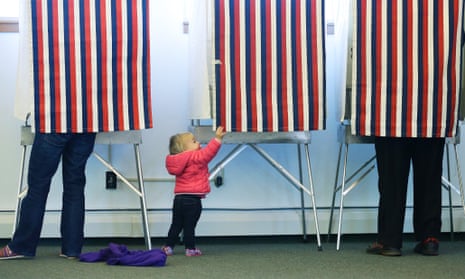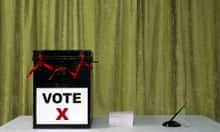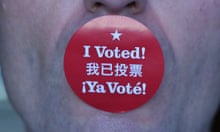Americans should be embarrassed. The low voter turnout on Election Day last week in the United States was an international disgrace.
What has become of a democratic form of government that Abraham Lincoln said was “of the people, by the people, for the people”? Can we be satisfied with a “democracy” when more than 60% of people don’t vote and some 80% of young people and low-income Americans don’t either? Can we be content when poll after poll shows that most Americans can’t even name the political parties that control the US Senate and House – or who their member of Congress is?
Nationwide, preliminary indications show that the total turnout in the US midterms was only 36.6%. If these estimates hold true, 2014 will be the least representative election in modern American history. When billionaires and corporations tilt elections, conservatives suppress voting and crucial voters feel unengaged, what kind of example for the world is that?
Americans do better when the presidency is at stake, but a post-World Word II turnout ranging from 52% to 64% is nothing to brag about. The International Institute for Democracy and Electoral Assistance ranks the United States 120th in the world for average national turnout. In Scotland, for example, 84.6% voted on the independence referendum. In Denmark, 80% of the population at the polls is the norm. In Australia, where voting is compulsory, turnout is even higher.
When Congress returns here this week, I will introduce legislation to make Election Day a national holiday – call it Democracy Day – so that everyone has the time and opportunity to vote. This would by no means be a cure-all for increasing turnout, but it would mark one important step to increase participation and create the kind of political system that the world can look upon as an example, not a failure.
To keep the super-rich from turning our democracy into an oligarchy, we must also focus on campaign finance. With dark money and TV ads playing such an important role in contemporary politics, how many candidates can run successful campaigns representing the interests of the struggling working families of our country? If people do not see candidates fighting for their interests, why will they vote at all?
We need a constitutional amendment to overturn the disastrous 2010 US supreme court ruling in Citizens United that let a corporate class spend unlimited sums. We also need public funding of elections so that candidates who are not rich or dependent upon the rich can actually win.
Meanwhile, instead of encouraging more people to take part in our democracy, Republican state legislatures and governors have aggressively passed laws to keep people away from the polls, especially low-income and young people. They have made it harder to register to vote. They have reduced opportunities for early voting. And they have made it more difficult to vote on Election Day by requiring picture IDs – supposedly to address all-but-non-existent voter fraud.
But voter-ID laws aren’t intended to discourage fraud – they are intended to discourage voting, and they have worked. A study I requested from the Government Accountability Office, a non-partisan congressional watchdog, found that states with strict voter-ID laws saw turnouts drop 2-3% compared to states without them. These disenfranchising laws are designed by people afraid of what would happen to them if more people were involved in the political process. What cowards!
For those of us who believe in a vibrant democracy with an engaged and well-informed electorate, we have a lot of work ahead. Sadly, in the year 2014, we must still convince the American people about the relevance of government to their lives.
We must convince young people that if they vote in large numbers, we can lower the 20% real unemployment they are experiencing with a major jobs program. We must convince students that if they participate in the political process, we can lower the outrageously high student debt they face. We must convince low-income workers that voting can raise the national minimum wage to a real living wage. We must convince seniors that not only can we prevent cuts to Social Security – we can expand the paltry benefits that so many are forced to live on. We must convince the millions of Americans who are deeply worried about climate change that political participation can transform our energy system away from fossil fuels to energy efficiency and sustainable energy – and create millions of jobs.
Throughout American history, people have fought and died to protect our democracy and set an example for other nations. In these very difficult times, we cannot turn our backs on them. We should celebrate it.






